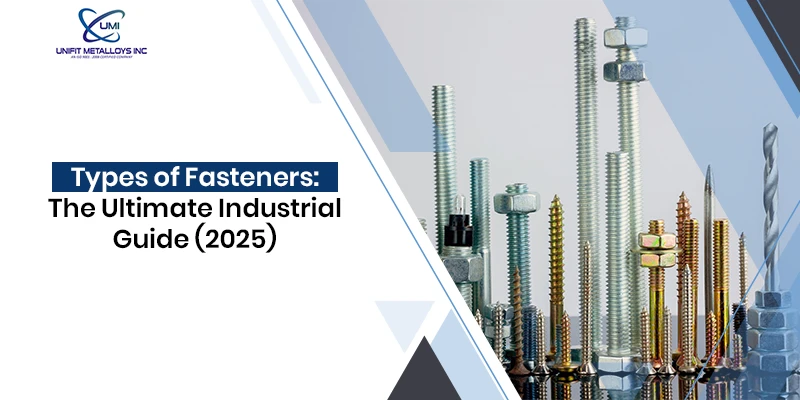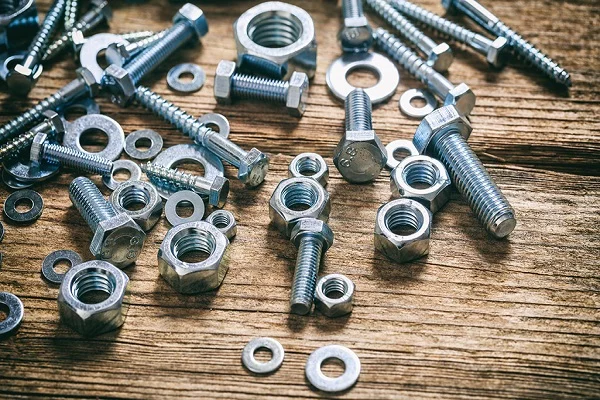
Fasteners form a critical foundation for industries such as construction, engineering, and manufacturing. Whether assembling heavy machinery, erecting buildings, or producing automotive components, selecting the correct type of fastener is essential for safety, longevity, and operational efficiency. As a trusted industrial fastener supplier, Unifit Mettaloy Inc. provides a comprehensive range of fasteners that strictly adhere to industry standards, delivering consistent reliability across diverse industrial applications. In this blog we will talk about the fundamental types of fasteners, including bolts, nuts, washers, and screws and discuss their specific industrial uses and applications.
What is a Fastener?
Before diving deeper into the different types and applications of fasteners, let's first clearly define what a fastener is. A fastener is a broad term covering a variety of mechanical components such as screws, washers, nuts, and bolts, all serving the primary purpose of mechanically joining two or more objects together.
Unlike adhesives, fasteners can securely bond materials including metal, plastic, wood, and concrete. They're especially crucial when joining parts that must withstand significant stress levels. Fasteners like screws, lock washers, and nuts are further divided into specialized categories including socket screws, wood screws, permanent fasteners, self-tapping screws, and many others.
Different Types of Fasteners and Their Applications

Fasteners can generally be grouped into two main categories: Permanent Fasteners and Non-Permanent Fasteners. As suggested by their names, permanent fasteners create joints intended to remain fixed indefinitely, whereas non-permanent fasteners form temporary connections that allow easy disassembly when necessary. The extensive range of available bolt head types and styles makes fasteners highly versatile and widely used. Mechanical fasteners come in various sizes and shapes, each suited to specific applications.
Exploring Common Types of Fasteners: Bolts and Nuts
Among the most essential types of fasteners used in industrial applications, bolts and nuts play a crucial role in forming strong and secure joints. Bolts offer the clamping force, while nuts lock them in place, creating a stable connection that can withstand stress, vibration, and dynamic loads.
- Hex Bolts are widely used across construction and mechanical industries due to their high tensile strength and load-bearing capacity. At Unifit Mettaloy Inc., we provide hex bolts in a variety of sizes, finishes, and materials for diverse applications.
- Carriage Bolts have a rounded head and square neck, making them ideal for fastening wood and metal surfaces with a smooth finish.
- Anchor Bolts are designed for fixing structures to concrete bases, making them indispensable in heavy civil and infrastructure projects
- Flange Nuts help distribute load more evenly, reducing the risk of loosening in high-vibration environments.
- Lock Nuts offer additional security in demanding conditions where joints are exposed to continuous movement or pressure
These types of fasteners are widely adopted in industries like automotive, structural engineering, heavy equipment, and fabrication where durability, safety, and long-term performance are non-negotiable. Unifit Mettaloy Inc. manufactures industrial-grade fasteners that meet the demands of high-stress environments while maintaining consistency and compliance.
Supporting Structures with Different Types of Fasteners: Screws and Washers
In addition to bolts and nuts, other critical types of fasteners such as screws and washers contribute significantly to joint integrity and assembly precision. These components help maintain structural balance, distribute pressure, and reduce material stress.
- Flat Washers spread the load of fasteners across wider surfaces, helping protect materials under pressure and preventing wear. Unifit Mettaloy Inc. offers washers in multiple grades and finishes tailored to specific applications.
- Spring Washers are used to apply tension and keep joints secure in high-vibration environments, commonly found in industrial equipment and mobile machinery.
- Self-Tapping Screws cut their own threads into material, simplifying installation and speeding up assembly processes without the need for pre-drilled holes.
- Machine Screws are suited for precision fastening in equipment and enclosures, providing a consistent grip and clean finish.
- Wood Screws are engineered to penetrate wooden materials cleanly without splitting, ideal for cabinetry, joinery, and interior structures.
These types of fasteners are essential for sectors like electrical equipment manufacturing, modular assembly, and woodwork. At Unifit Mettaloy Inc., we offer a robust range of industrial screws and washers designed for long-term use and high mechanical reliability helping professionals achieve safe, efficient, and durable assemblies.
Choosing the right Fastener Manufacturer and Fastener Supplier
Selecting a reliable fastener manufacturer and supplier is just as critical as choosing the fasteners themselves, especially for industrial operations where performance, safety, and timelines are non-negotiable. A dependable supplier should offer consistent product quality, technical expertise, and a wide inventory that meets various industrial standards and specifications. Key factors to evaluate include the manufacturer’s material sourcing, testing protocols, product range, and industry certifications. Suppliers should also offer flexible order quantities, timely delivery, and responsive support to keep your operations running smoothly. By partnering with the right fastener manufacturer and supplier, industries can reduce procurement risks, improve assembly efficiency, and maintain the structural integrity of every project.
Why Choose Unifit Mettaloy Inc. for Your Industrial Fasteners?
We are a reliable partner for industries looking for fasteners that deliver consistent performance across demanding applications. We supply a comprehensive range of screws, bolts, nuts, washers, and custom fastening solutions which are all manufactured to meet strict quality standards. With a focus on material variety, application-specific options, and technical support, we help engineers and procurement teams find the right fit for their projects. Our competitive pricing, dependable delivery, and responsive service make us a preferred choice for industrial buyers across sectors.
Conclusion
Industrial fasteners might appear to be simple, small components, but their role is undeniably crucial across numerous industries. Whether it's stainless steel fasteners ensuring sanitation in food processing facilities or heavy-duty bolts maintaining the structural integrity of skyscrapers, these seemingly modest hardware pieces underpin the functioning of our modern world. Regardless of whether you're a manufacturer, engineer, or DIY enthusiast, having a solid understanding of various fasteners and their specific applications is critical. Selecting the right fastener guarantees the safety, effectiveness, and durability of your projects.
At Unifit Mettaloy Inc., we pride ourselves not just on being a leading supplier of fasteners, but also on our commitment to educating and informing our community through insightful articles like this.
Frequently Asked Questions (FAQs) About Types of Fasteners
1. What is the difference between a bolt and a screw?
A bolt is designed to be used with a nut: it passes through unthreaded holes and is tightened by torque-ing the nut. A screw, in contrast, either mates with existing threads or cuts its own into the material and is tightened by turning the head. Bolts often feature an unthreaded shank for added shear strength and require a nut, while screws are usually fully threaded up to the head and generate their own clamping force.
2. Can stainless steel fasteners rust?
Yes. Although stainless steel resists corrosion thanks to its chromium-rich passive oxide layer, it is not completely rust‑proof. Lower‑grade types like 304 may still corrode in harsh environments or chlorides; 316 stainless is more resistant but can still suffer crevice or pitting corrosion in marine settings. Instances of rust, even on 18‑8 stainless screws exposed to moisture and salt are documented.
3. What fastener material is best for marine use?
Type 316 or 316L stainless steel is the preferred standard for environments exposed to saltwater (e.g. docks, boats, coastal installations) due to its excellent resistance to pitting and chloride corrosion thanks to added molybdenum. In more aggressive marine conditions (fully submerged, high chloride), super‑austenitic (UNS S31254) or super‑duplex alloys (UNS S32760) with PRE > 40 provide even greater durability. Other options like silicon bronze and Monel are also used for their corrosion resistance and compatibility in galvanic environments.
4. What are ASTM A193 and A194 standards?
- ASTM A193 defines high-strength bolts and studs made from carbon, alloy, or stainless steel intended for high-temperature or high-pressure service (e.g. pressure vessels, flanges).
- ASTM A194 specifies the corresponding heavy‑hex nuts (carbon, alloy, martensitic, and austenitic stainless) sized from ¼″ to 4″ (or metric M6–M100) to match A193 bolts under high‑pressure or temperature conditions. These standards ensure bolt‑nut compatibility and performance in demanding industrial applications.
5. How do I determine torque requirements?
Torque requirements are derived from desired clamp load (preload) and friction factors using the formula T = K·D·P, where K is the nut factor or coefficient of friction, D is nominal diameter, and P is clamp load. Standard torque tables, often published for ASTM grades such as A193 B7 and nuts A194 2H, provide recommended values for both dry and lubricated conditions. For accuracy, follow manufacturer-specific charts tailored to fastener material, lubrication, size, and grade.